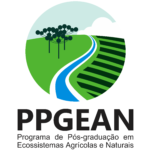RESEARCH GROUPS
The PPGEAN faculty is directly involved in seven research groups located at UFSC Curitibanos, as follows:
Conservation Agriculture
This group develops research on land use suitability; conservation management of natural resources; soil-plant-atmosphere relationships; and integrated pest and disease management. The main goal of this research group is to generate scientific knowledge on agricultural management and productive strategies for the conservation of production systems. In this context, the agricultural ecosystem is considered as an integrated and dynamic system, formed by several processes that involve the flow of energy and matter between soil, plants, and atmosphere. Faculty participating in this research group: Adriana Terumi Itako, João Batista Tolentino Junior, Alexandre ten Caten, Júlia Carina Niemeyer, Leosane Cristina Bosco, Cesar Augusto Marchioro and Karine Louise dos Santos.
Plant Biology and Management Studies Center
This research group develops basic and applied research in plant biochemistry, physiology, management, genetics, and breeding. The studies carried out in this group focus mainly on species of agricultural interest. Faculty participating in this research group: Patrícia Maria Oliveira Pierre Castro and Leocir José Welter.
Ecosystem Ecology
This research group develops studies on the management and conservation of fauna and flora; environmental monitoring and ecological risk analysis; ecological interactions; and forest ecology. Its main goal is to generate scientific knowledge in the field of Ecology, using tools that make it possible to infer the processes involved in the relationship between agents and the repercussions in the use of resources in different ecosystems. The developed studies show interdisciplinary characteristics, involving topics such as natural resource ecology, inventory and management; conservation biology; health and environmental monitoring, and human-environment interaction. Faculty participating in this research group: Alexandre Siminski, Alexandre Tavela, Cesar Marchioro, Julia Niemeyer, Greicy Conterato and Paulo Cesar Poeta Fermino Junior.
Forest Resources Management and Technology
This research group aims to generate scientific knowledge about plant diversity, development and management with a view to its application in strategies for the conservation, improvement and use of agricultural and forest species. The research developed in this group is transdisciplinary as it integrates studies on the management of forest resources, ecological restoration and agroforestry, forestry, forest protection, and the use of forest products. Faculty participating in this research group: Alexandre Siminski and Karine Louise dos Santos.
Plant Genetic Resouces
This research group develops studies on the following topics: a) knowledge of the genetic structure of populations of domesticated and non-domesticated plants, aiming to support strategies for collecting, conserving, domesticating, breeding and managing species; b) genetic characterization using molecular markers, aiming to deepen knowledge of the genetic structure of populations and support plant collection, conservation, management and genetic improvement programs; c) construction of genetic maps for species of economic and ecological importance for the South of Brazil, as an instrument of indirect selection and knowledge of the organization of genetic variability; d) generation of segregating populations; e) Collection, mass micropropagation, breeding and conservation of plants; f) Establishment of in vitro regenerative protocols for the conservation and propagation of target species.
Tropical Forest Research Center
With more than 30 years of research in the forestry area, this research group focuses on projects related to secondary forest formations, forest policy, and environmental restoration. Faculty participating in this research group: Maurício dos Reis and Alexandre Siminski.
NESBIO –Socio-Agrobiodiversity Studies Center
This research group is dedicated to the study of the interrelationships between human populations and agricultural and natural resources. The main goal of the group is to support research and outreach actions that promote the conservation and restoration of ecosystems, as well as the practice of biodiverse production systems. The lines of research in the group are (i) agroforestry and restoration ecology; and (ii) ethnobotany and on-farm conservation. More information can be obtained on NESBIO website. Faculty participating in this research group: Alexandre Siminski and Karine Louise dos Santos.
NEUVIN- Grape and Wine Studies Center
NEUVIN generates scientific knowledge and trains qualified professionals working in Brazilian viticulture. The objective is the constant search for the scientific deepening of the main topics that determine the quality of grapes and wine related to genetic improvement, development physiology, and management in wine quality. Currently, the priority of this research group is focused on the development of disease-resistant varieties, production technologies of “savoir-faire” quality, and quality of wines and sparkling wines. The studies are carried out by professors, researchers, and undergraduate and graduate students at UFSC in partnership with EPAGRI and the European institutions: Edmundo Mach Foundation – FEM (Trento-Italy), CIRAD and INRA Montpellier (France) and Julius Kühn- Institut – JKI (Geilweilerhof, Germany). More information about this research group can be obtained on NEUVIN website. Faculty participating in this research group: Cristian Soldi, Leocir José Welter and Miguel Pedro Guerra.







